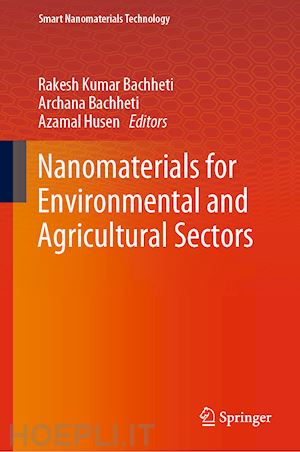
Questo prodotto usufruisce delle SPEDIZIONI GRATIS
selezionando l'opzione Corriere Veloce in fase di ordine.
Pagabile anche con Carta della cultura giovani e del merito, 18App Bonus Cultura e Carta del Docente
This book gives a complete overview of current developments in nanotechnology-based environmental remediation and sustainable agriculture practices/sectors. It will provide the use of nanotechnology in the agricultural sector such as crop production and improvement, soil fertility management along with benefits and risks of nanotechnology on ecological farming. Additionally, the book also discovers how nanotechnology is used in water, air remediation techniques and major challenges in using nanomaterials for improving water and air quality. The book can be a reference source for academicians, scientists, policymakers, students, and research scientists working in minimizing the environmental pollution and increasing agricultural production using nanoparticles.
Rakesh Kumar Bachheti graduated from the Hemwati Nandan Bahuguna University, Garhwal, India, in 1996. He completed his MSc in Organic Chemistry from Hemwati Nandan Bahuguna University, Garhwal, India, in 1998. He had undergone a one-year Post Graduate Diploma in Pulp and Paper Technology from Forest Research Institute, Dehradun, in 2001. He obtained his Ph.D. in Organic Chemistry from Kumaun University, Nainital, India, in 2007. He is presently working as an Associate Professor of Organic Chemistry in the Department of Industrial Chemistry at the Addis Ababa Science and Technology University (AASTU) of Ethiopia, where he teaches Ph.D., graduate, and undergraduate students. Before joining AASTU, Rakesh was working as Dean Project (Assistant) at Graphic Era University (A grade university by NACC) in Dehradun, India. Rakesh also presented papers at various international (Malaysia, Thailand, and India) and national conferences. He was also a member of various important committees, such as the Internal Quality Assurance Cell (IQAC), Anti-ragging committee.
His major research interests include natural products for Industrial application, biofuel and bioenergy, green synthesis of nanoparticles, their application and Pulp and paper technology. He retains a fundamental love for natural products, which permeates all of his research. He has also successfully advised 30 MSc and 3 Ph.D. students to completion, and countless undergraduates have researched in his laboratory. Dr. Bachheti is actively involved in curriculum development for BSc/MSc/Ph.D. programs. Dr. Bachheti is an editor of 4 books and 70 publications, dealing with various aspects of natural product chemistry and nanotechnology and has twenty book chapters published by Springer, Elsevier, and Nova Publisher. Presently, he is supervising 5 Ph.D. students and 2 Master's students and works on two research projects funded by AASTU.Archana Bachheti did BSc in 1997 and MSc in 1999 from HNB Garhwal University. She received her Ph.D. from Forest Research Institute, Dehradun, India, in 2006. She has carried out research projects and consultancy work in the areas of ecorestoration/ development of wasteland, physico-chemical properties of Jatropha curcus seed oil and their relation with altitudinal variation, and has been a consultant Ecologist to a project funded by a government agency. Dr. Joshi is currently Professor at Graphic Era University, Dehradun, India. She has also served in many capacities in academia within India and provided expertise internationally for more than 15 years. She taught Ecology and Environment, Environmental Science, Freshwater Ecology, Disaster management, and Bryophytes and Pteridophytes.
Her major research interests encompass the broad, interdisciplinary field of plant ecology, focusing on ecorestoration, green chemistry, especially the synthesis of nanomaterial, and medicinal properties of plants. The breadth of her research spans from degraded land ecological amelioration and physical and chemical properties of plant oil to plant-based nanomaterial. She guided one Ph.D. student, supervised three scholars, and guided graduate and undergraduate students with their research projects. While the fascination with forest biodiversity captured her interest, it has been her love for the exploration of values of biodiversity and social upliftment through it that has maintained that passion. Dr. Joshi is the editor of 4 books and has published over 55 research articles in international and national journals and sixteen book chapters. She organized several National seminars/conferences at Graphic Era University, India.
Azamal Husen served as Professor & Head, Department of Biology, University of Gondar, Ethiopia and is a Foreign Delegate at Wolaita Sodo University, Wolaita, Ethiopia. Earlier, he was a Visiting Faculty of the Forest ResearchInstitute, and the Doon College of Agriculture and Forest at Dehra Dun, India. His research and teaching experience of 20 years involves studies of biogenic nanomaterial fabrication and application, plant responses to environmental stresses and nanomaterials at the physiological, biochemical and molecular levels, herbal medicine, and clonal propagation for improvement of tree species. He has conducted several research projects sponsored by various funding agencies, including the World Bank (FREEP), the National Agricultural Technology Project (NATP), the Indian Council of Agriculture Research (ICAR), the Indian Council of Forest Research Education (ICFRE); and the Japan Bank for International Cooperation (JBIC). He received four fellowships from India and a recognition award from the University of Gondar, Ethiopia, for excellent teaching, research, and community service. Husen has been on the Editorial board and the panel of reviewers of several reputed journals published by Elsevier,Frontiers











Il sito utilizza cookie ed altri strumenti di tracciamento che raccolgono informazioni dal dispositivo dell’utente. Oltre ai cookie tecnici ed analitici aggregati, strettamente necessari per il funzionamento di questo sito web, previo consenso dell’utente possono essere installati cookie di profilazione e marketing e cookie dei social media. Cliccando su “Accetto tutti i cookie” saranno attivate tutte le categorie di cookie. Per accettare solo deterninate categorie di cookie, cliccare invece su “Impostazioni cookie”. Chiudendo il banner o continuando a navigare saranno installati solo cookie tecnici. Per maggiori dettagli, consultare la Cookie Policy.